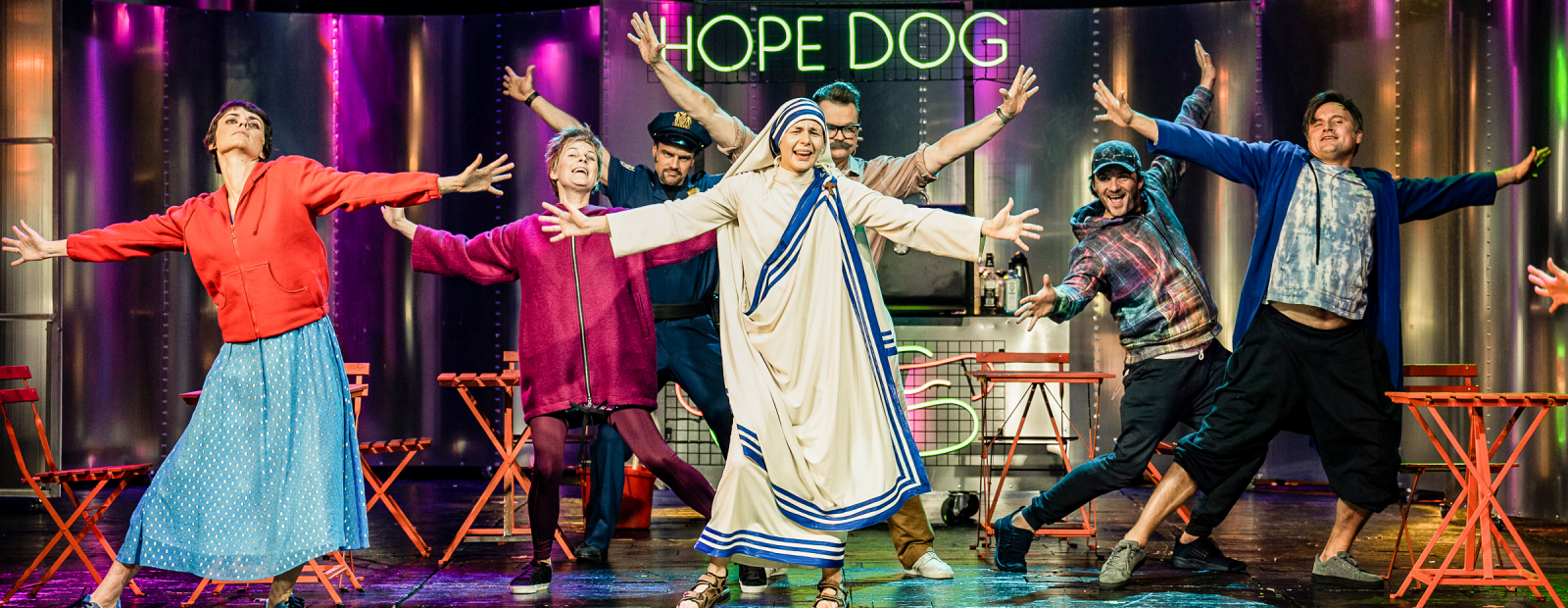The plays of contemporary American playwright Steven Adley Girg, created by director Mārtiņš Eihe The last days of Judas Iscariot the production in the Great Hall of the Daile Theater is announced with a careful warning that laughter is to be expected at death, violence and suicide, that sexism, homophobia and racism will be heard in the characters’ witty responses. The work is, without a doubt, intended as a provocation, which was certainly revealed even more vividly when it was published way back in 2005. In it, many problems related to the always controversial issues raised by the Bible are fearlessly devoted to the attacks in quite rational, even provocative coordinates – on the unconditional love of God, which nevertheless has limits, when some people have to suffer more than others, on the existence of any human freedom of choice and, consequently, on the importance of responsibility personal, if once Christianity lives according to God’s predetermined plan, for the eternal presence of evil, from which no one ever learns and can learn, if, in the words of Saint Monica, human temporal life is only the first kilometer out of a billion.
In addition to everything else, the playwright solves the theological marriage by wittily playing with the biographies of his characters, more precisely – with the modest surviving testimonies about them. Furthermore, since there is no and there cannot be reliable information on their authenticity, the reader has no reason to fear being burdened with an accurate historical reconstruction of the events represented. At the same time, more than one ingenious aphorism is woven into the text, which keeps thoughts occupied even outside the context of the play and performance.
Spirituality does not disappear
Nowadays, it is practically impossible to impress anything in life, let alone on stage, which has experienced almost unlimited technical possibilities. And it is no longer possible to turn a blind eye to the discrediting of the church, without it, the world crises, in which the lives and lives of innocent people are taken without justification, only create more unanswered questions. However, after the raising of fists, it is clear that the work does not intend to insult the feelings of believers: the author himself, understandably, unable to provide comforting answers to these eternal questions, does not give up the need for introspective reflection on the spot of people on earth and the conditions of coexistence, offering to give up paternalism, to decide on an action, to avoid despair and stereotypical thought constructions about good and evil, in the end – to be ourselves. And even then, spirituality does not disappear anywhere – it remains an ethical imperative and a pledge of survival, because, in the words of Satan, if God had not lied about the key to the gates of heaven, man would have no incentive to try to be even half as good.
The creators of the show boldly accept such rules of the game, for their part acutely recalling that Jesus has been to Mariupol and also knows the corridors of power of Vladimir Putin. All characters, which include mostly biblical figures and people of seemingly universal religious influence, are removed from any semblance of empirically unverifiable authority. Furthermore, it is important that neither the scenography, nor the domestic visual image of the characters, taken care of by the set designer Pamela Butāne and the costume designer Rūta Kuplā, practically did not use religious symbolisms, thus deliberately avoiding degrading even the last possibility of faith. These are modern people – this is confirmed not only by the lines composed by the playwright, in which there is no shortage of blunt words and scornful humor, but also by the stage existence unleashed by the actors, easily recognizable flirtatious, excited and irritated intonations and their corresponding behavior. Thus Santa Monica, in a hooded sweatshirt, has switched to boxing and has a bruise under her left eye, San Matteo and San Pietro, in bathing suits, lazily drink sparkling wine and nibble on a grape, while Pontius Pilate enchants the I post a brightly colored aviator jacket, which is supposed to testify to the hero’s muscular height.
Casual fun
The space offered by the playwright is abstract, even impersonal, as the only prop is the judge’s gavel, but the change of light is meant to change the atmosphere, allowing the actor to imagine life in purgatory, where the appeal process in the case of the kingdom of heaven against Judas Iscariot takes place throughout the game. The playwright also offers no original scene passages, except for the unexpected appearance and disappearance of witnesses called to the trial. On the other hand, in the show, the stage is organized by fragments of curved metal planes reflecting ghostly lights, but the director Mārtiņš Eihe avoids the monotony of the planned stage action, not only relying on the mastery of the actors, but also actively using the cameras – both when the operator films what happens on stage and when he resolves the immaterial presence of the characters in the video projections.
On stage is relaxed fun, a wagon of fast food and takeaway coffee with an ironic name Hope Dog and the neon lights testify to the persistence of the vices of the consumer society. The plastic plants planted in the lowered proscenium, which wittily rise to stage level after a gesture of Jesus’ hands, make us smile good-naturedly at the miracles of naïve faith.
The show is a conceptual manifesto of the relativism of the surrounding values - the only meaning is to participate, keeping one’s perspective on things. But isn’t the life position of such a rational cynic the only possible one in this crazy reality of life that cries out to heaven? In any case, the atmosphere created favors active coexistence, passion together with the characters, until in the somewhat clouded attention of laughter, we must find ourselves confused as to what we are laughing about.
A winged creature named Gloria, sounding on a slightly melancholy note, sadly recalling her children left on earth, already in the introduction frees the reader from previous ideas about the afterlife, turning into a reality show host on stage. The name given to the show The midnight show with Judas Iscariot, which brings to mind the show created by Mārtiņš Eihe ten years ago in the Sala Piccola of the Daile Theater, staging a play by another American author, Tony Kushner Angels in America whose content core was also formed by a cynically ironic reflection on the crisis of xenophobia, domination and religion, which was given impetus by musical and choreographic interludes, recalling the aesthetics of the show.
A sense of community
This time, in the development of the plot of the work, the dynamics of the action are not foreseen, and the emotional or intellectual development of the characters is not planned. Moreover, even the presence of Judas and Jesus is not of paramount importance, the main attention is paid to the emotional competition between the prosecutor and the lawyer, which, among other things, signals the individual’s own conditional role in the decide matters important to him. Thus, the inexorable life of Kaspars Dumburas and Ilze Ķuzules-Skrastiņas in the characters is essential to maintain the pace of the performance, they practically do not leave the stage during the entire duration of the performance. One can only admire the energy reserves of Kaspars Dumburas, because he virtuously doses the passion of his abilities, the expressive grimaces and the implacable plasticity of the body coexist with the inexhaustible psycho-emotional activity of the hero.
On the other hand, in the background, it is almost impossible to identify any of the actors, because almost all of them have found an original facet that makes their character unique. In the introduction, Lilitas Ozoliņa’s resigned monologue of Judas’ mother on her inexhaustible motherly love sets a dramatic tone, reminding us of Antigone’s boundless devotion to her ideals, unbent by the weight of years. Kristīne Nevarauska proves to be an expert characterization in the role of St. Monika, a real pragmatic and somewhat snobbish politician. Ieva Segliņa in the character of Mother Teresa reminds us that even a nun is still a woman in her years. Andras Buli’s Saint Thomas is unexpectedly self-deprecating, her child, to whom Judas gives his toy train, is truly moving. Irresistible in the role of Satan is Niklavs Kurpnieks, who, slightly controlling his quick stage temper, paradoxically achieves such an effect that he transforms his character into Mephistopheles, who “wills evil forever, but always does good” .
The actors, surprising with the bright individuality of their characters, bring vitality and sparkling reality to what is happening on stage. The sense of togetherness of the acting ensemble is reflected in the musical performances (Mother Teresa sings with the shrill voice of Ieva Segliņa I said a little prayer, Pontius Pilate performs in the dramatically worn timbre of Ginta Gravelis One of us) and manifests itself in video clips of a broadcast disco party that threatens to turn into a crazy rave.
A common philosophical denominator
For a moment it seems that, indulging the frivolous joy of the game, the director had no intention of delving into the research of the theme, unless the message is limited to the knowledge that after the celebration the guests will have to endure a hangover , in other words, in the morning, all alone, she will have to accept whatever comes. However, in the finale, the creative team manages to find a common philosophical denominator. In it, Judas languishes on an unobtrusively constructed desert island monotonously spinning on the stage wheel. Unlike playwright Laura Dzelzīš’s idea, the character played by Laura Dzelzīš does not disappear anywhere in the course of the play, although he is also an outcast, he is present as a silent reproach to himself, to those around him and also to the audience, mostly silent and who inhabit the background of the stage without a destination or future perspective, which the actor manages to fill with existential tension.
Mārtiņš Upeniek’s Jesus, portrayed with hippie meekness, seems to know in advance that he will not be able to convince Judas of the promised salvation of reconciliation, but tries again in vain to strike him. After that, all the other heroes take their places on the dry blanket of sand, as if to confirm that we are all here and we remain next to each other, no matter what wrong paths we have taken and if those around us, meeting only in some random situation in life, they were lucky enough to see us to the best we are capable of. Well, everyone is tired, but everyone is still themselves.
THE MIDNIGHT SHOW WITH JUDAS ICARYOT
in the Theater of Fine Arts on 13.XI to 18, 15.XI, 21.XII, 17.-19.I to 19
Tickets Ticket havens in the network EUR 15–37


